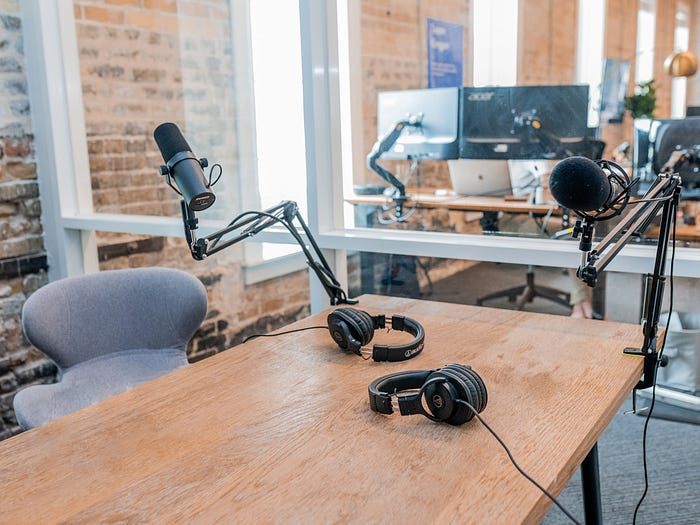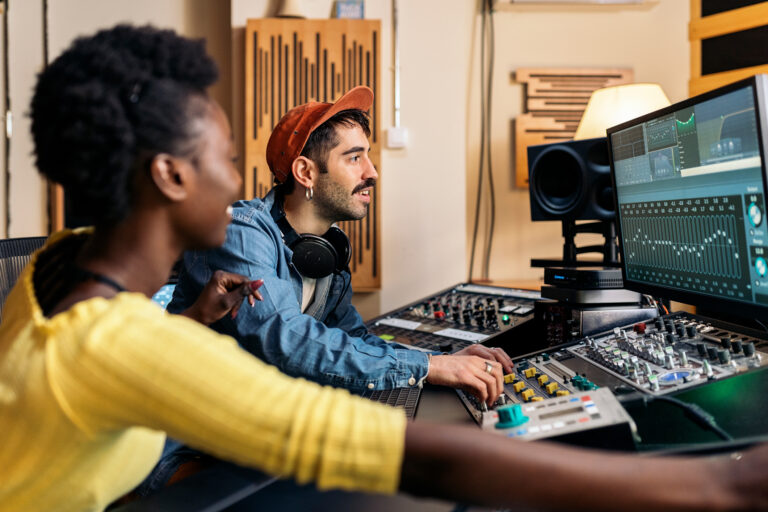
It’s inevitable.
I’ve worked with many different brands to help develop many different podcasts. In every single show development session, these questions always come up:
- Who should host our show?
- Do we hire a celebrity?
- Do we choose someone internally?
- Should my boss be the host?
It’s an important choice. A good host plays a crucial role in the success of any podcast. At Pacific Content, we’ve worked with a wide range of hosts on a wide range of projects. We’ve worked with bestselling authors, well-known celebrities, experienced journalists, leading academics, and corporate executives. We’ve also made shows with unnamed voices who have little or no public profile.
Across this range, we’ve discovered a few key indicators that suggest someone will be a great podcast host. Some are deal-breakers, others are teachable skills, and still others are “nice to haves” depending on the project.
Here’s what we look for:
A spirit of partnership
This one is non-negotiable. A good host is more than a hired gun. They’re a true partner: someone who genuinely wants to work with your brand to deliver an amazing, world-class, audience-first show.
Good hosts take pride in the shows they make. Avoid hosts who begrudge branded content, or seem like they’re doing it simply to collect a paycheque.
Podcasting is a medium that prizes authenticity. If your host isn’t genuinely interested in the project, it’ll be obvious to listeners.
You’re looking for a partner, not a hired gun “influencer.”
Performance
In my former life as a public radio producer, we often talked about a host’s ability to “lift a script off the page.” That’s another way of saying, “Does this person sound like they’re reading?”
Podcast performance skills can be taught. If a host doesn’t have much experience working in audio, you can train them on the physical aspects of performance (posture, focus), the art of rehearsal, how to speak conversationally, how to take direction, etc. Performance chops are like martial arts — no matter how long you’ve been doing it, there’s always room to improve. A good host understands this, and will want to improve their hosting ability.
While these skills can be taught, it helps to work with a host who already has demonstrated ability… especially if you’re working on a tight timeline.
Storytelling
Audio has incredible narrative bandwidth, and a good host understands the craft of storytelling. They should understand story structure, focus statements, point of view, choice points, drama, and stakes.
For example, IRL: Online Life is Real Life is hosted by Manoush Zomorodi, an experienced journalist and author. Before coming to IRL, Manoush had a proven track record of telling stories with sound through her work on Note To Self and ZigZag.
Look for hosts who think in stories.
Interviewing
Interviewing is a skill. Many people dedicate their entire careers to it.
If you want your host to conduct interviews, make sure they can actually conduct interviews. Like performance, interviewing can be taught, but it’s often a slow process with a steep learning curve. Do you want your audience to hear your host learn on the job?
An interviewer is a proxy or surrogate for the audience. Good interviewers understand this. Look for a podcast host who:
- Knows how to listen. Listening is perhaps the most important skill in interviewing.
- Follows their curiosity. You can’t fake curiosity.
- Is comfortable going off-script, improvising, and challenging guests if needed.
Of course, your host needn’t conduct interviews themselves. In many show formats, a talented producer can conduct the interview, and a host can narrate across and between interview clips. But if one-on-one interaction matters, find a host who can interview.
(For an excellent primer on the art of interviewing, I highly recommend The Turnaround with Jesse Thorn.)
Credibility and subject area expertise

One of the biggest assets a host brings to the table is their credibility and subject area expertise. Two examples:
- Command Line Heroes is Red Hat’s show for open source software developers, sysadmins, and IT architects. It’s hosted by Saron Yitbarek, a software developer who uses open source technologies in her own work.
- Choiceology is Charles Schwab’s show about making better decisions. It’s hosted by Katy Milkman, a Wharton prof and decision scientist.
Both shows benefit from their hosts’ credibility and subject area expertise. Scripts are better, question lines are tighter, and interviews are stronger because Saron and Katy know their stuff.
What’s more, if your host is well-known and well-respected in their field, it often becomes easier to book guests. With Katy as host, Choiceology has featured behavioral economics superstars like Daniel Kahneman, Angela Duckworth, and Nobel prize-winner Richard Thaler.
Of course, subject-area expertise isn’t a prerequisite for all show formats. For example, Zendesk’s Repeat Customer is a show about amazing customer experiences, hosted by Pacific Content staffer Mio Adilman. Though Mio doesn’t have a formal background in CX, he does have a tremendous curiosity about the field, which makes him an excellent proxy for the audience. In many ways, the show is stronger because of Mio’s “everyperson” point-of-view on CX. If Zendesk had hired a industry insider as host, Repeat Customer would be a very different show.
Make sure your host fits your format, and vice versa.
An audience of their own
This one’s tricky.
A potential host may have a large social following, or large YouTube channel, or a passionate fanbase in another medium. That’s great.
Your host’s existing owned channels can be powerful audience-building tools. But here’s the thing: your host needs to actually use their channels in an effective, authentic, and genuine way. What’s the point of hiring a host based (in part) on their Twitter following if they never actually tweet about the show? Or worse, what if their tweets are lacklustre, seemingly written out of a sense of begrudging obligation?
Yes, you can enshrine social posts and cross-promotion in a host’s contract.
But here’s what’s difficult to build into a contract: enthusiasm, excitement, and a genuine desire to share the show you make together.
Here’s an example I love: CTO.ai’s show if/else is hosted by Mayuko Inoue, a software developer and YouTuber with nearly 250k subscribers. Here she is, sharing the show with her YouTube audience:
You can tell how excited Mayuko is to share if/else with her audience. The show is presented as a gift: We made this thing for you, and I think you’re going to love it.

It’s unlikely you’ll find all these attributes in a single person.
For instance, you might find a supremely talented interviewer with a great on-mic presence, but they have little or no public profile.
Or you might find a well-known subject matter expert with a large existing audience, but they’ve never conducted a podcast interview before.
Certain podcast skills are teachable, like performance and interviewing. Some attributes are built-in, like a host’s existing audience or professional bona fides.
But remember: a spirit of partnership is non-negotiable. You can’t train for that.
Sign up for the Pacific Content Newsletter: audio strategy, analysis, and insight in your inbox. Once a week.



